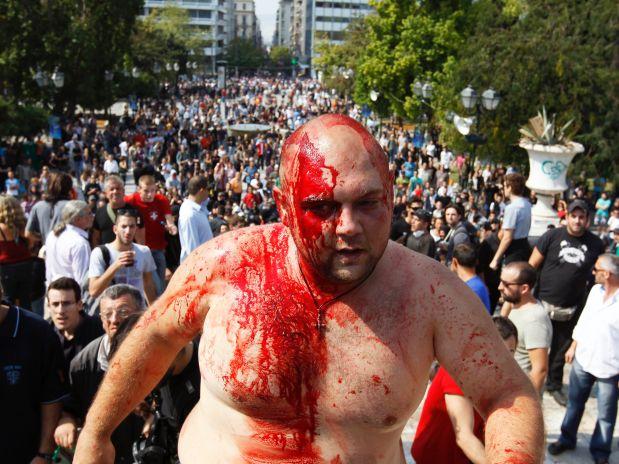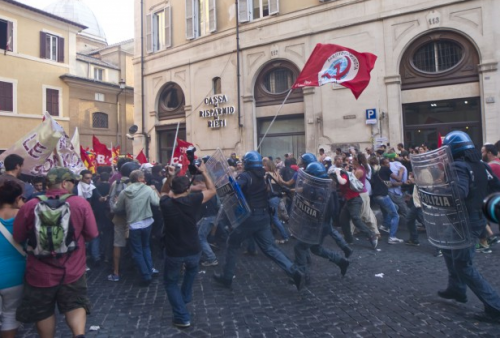 Today the Greek population is expecting more violent episodes against protesters around the country, as the second 24h general strike in a few months takes place. The estimates are that around 20 thousand people have stayed home in Athens alone: the strike was led by unions and called for in private and public sectors, including lawyers, teachers, state hospitals, air traffic controllers and public transport, who will operate under minimums to allow more people to reach protests. All day long people have been gathering in the iconic Syntagma Square, the center point of the movement in Athens, located right in front of Parliament. These actions are a result of the severe desperation of citizens around the country, who are being suffocated by the brutal austerity measures programmed by the Troika (IMF, European Central Bank and the European Commission). The latest news is that at least 30,000 civil servants will be laid off to try and reach the 7.5% public deficit benchmark, agreed for the second massive loan to take place (the figure is currently at 8.5%). This has led to the general notion that all the costs are being pushed onto the population, while the benefits of the bailout deal lie with the bankers, as ex-European Central Bank economist, Omar Issing, openly admitted to the New York Times: “Everyone knows this was a good deal for the banks [...] it will not help Greece at all.”
Today the Greek population is expecting more violent episodes against protesters around the country, as the second 24h general strike in a few months takes place. The estimates are that around 20 thousand people have stayed home in Athens alone: the strike was led by unions and called for in private and public sectors, including lawyers, teachers, state hospitals, air traffic controllers and public transport, who will operate under minimums to allow more people to reach protests. All day long people have been gathering in the iconic Syntagma Square, the center point of the movement in Athens, located right in front of Parliament. These actions are a result of the severe desperation of citizens around the country, who are being suffocated by the brutal austerity measures programmed by the Troika (IMF, European Central Bank and the European Commission). The latest news is that at least 30,000 civil servants will be laid off to try and reach the 7.5% public deficit benchmark, agreed for the second massive loan to take place (the figure is currently at 8.5%). This has led to the general notion that all the costs are being pushed onto the population, while the benefits of the bailout deal lie with the bankers, as ex-European Central Bank economist, Omar Issing, openly admitted to the New York Times: “Everyone knows this was a good deal for the banks [...] it will not help Greece at all.”
 At least 40 injured and Rome left billowing in smoke after anti-austerity protesters clash with riot police in front of Parliament for over two hours tonight.
At least 40 injured and Rome left billowing in smoke after anti-austerity protesters clash with riot police in front of Parliament for over two hours tonight.
After weeks of dithering on the precipice of his own downfall, Silvio Berlusconi tonight survived a crucial vote of confidence, by one of the narrowest possible margins, allowing his government it to push through its proposed package of deeply unpopular austerity measures.
The cutbacks and tax hikes had been demanded by the European Central Bank in exchange for its buy-up of Italian bonds on secondary markets, after markets turned their sights on Italy last month, pushing the government’s borrowing costs close to the level where Greece had previously required an EU bailout.
But as Parliament prepared to vote on the austerity measures, violent clashes broke out between protesters and riot police. Downtown Rome was left billowing in smoke and littered with debris as at least 40 protesters were injured by random rounds of police baton charges.
Massive riots have turned North London into an “absolute war zone”, with a bus, three patrol cars and numerous buildings set on fire.
North London has erupted in violence tonight following the shooting dead of a 29-year old father of four by police on Thursday. Earlier tonight, a peaceful protest was held to demand answers about the circumstances of the lethal shooting. As night fell, the protests turned to violence.
A bus, three patrol cars and numerous buildings were set on fire, with looting going on too. Police were seen to be in heated clashes and running street battles with rioters who threw stones and firebombs at the officers. According to one witness cited by the BBC, the scene looked like “an absolute war zone.”
Another witness reports that “the whole of the police station is surrounded by… about 100 police officers in riot gear and they threw a wheelie bin into it and then started throwing bricks, street signs, anything they could get their hands on, straight at them.” Police have brought in horses, dogs and even a helicopter.

(photo: David King)
Public workers, up to seven hundred and fifty thousand teachers and civil servants, are alleged to have participated in a June 30 general strike called for in the United Kingdom after UK Parliament passed changes to pensions and retirement, specifically, increasing the amount an employee has to contribute.
At 1:31 pm London Time, Hélène Mulholland reported from the end of “the Strand, by Trafalgar Square,” that a march had been “good-natured” so far. “ She said it is clear that the turn out has been good, that quite a few in the UK believe the government did not properly negotiate the new pension and retirement changes. And she also reported, “There doesn't seem to have been much trouble," except for the stopping and searching of minority students.
Around 12 pm London Time, she “walked past five police officers stopping and searching two non-white 17-year-old sixth formers, Aamir Kadir and Jean-Claude Goddard, in Lincoln's Inn Fields to the dismay of onlookers.” Mulholland said they were searched because they were wearing keffiyeh scarves, a traditional headdress for Arab men. While there were white women with scarves standing around the two young men who were stopped, the police said they stopped the two because the scarves might be used to commit violence. They said they were stopped out of “empirical judgment” because “people use keffiyehs to mask their identity.”
Throughout the strikes today, the UK police have claimed stop and search powers under section 60 of the Criminal Public Order Act. Here is how this provision allowing police the legal right to stop citizens and search them in public is described on the Metropolitan Police website:
Section 60 Criminal Justice and Public Order Act 1994, gives police the right to search people in a defined area at a specific time when they believe, with good reason, that: there is the possibility of serious violence; or that a person is carrying a dangerous object or offensive weapon; or that an incident involving serious violence has taken place and a dangerous instrument or offensive weapon used in the incident is being carried in the locality. This law has to be authorized by a senior officer and is used mainly to tackle football hooliganism and gang fights.
In this case, the police are using Section 60 to thwart the “hooliganism” of public and civil servants who feel they just got a bad deal from their government, who are upset they might have more trouble making ends meet for their family.
Theme by Danetsoft and Danang Probo Sayekti inspired by Maksimer